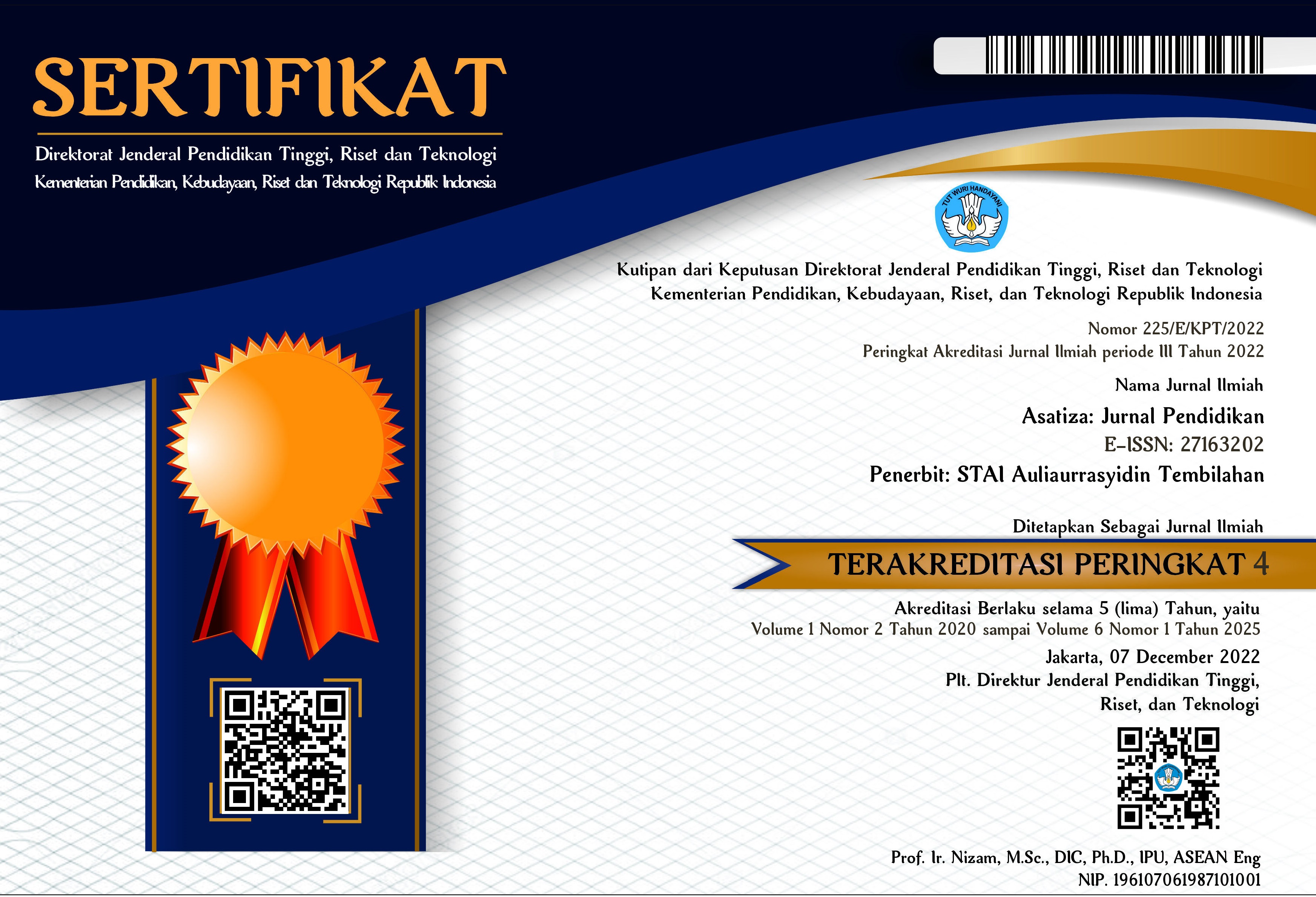Strategi Cooperative Learning Tipe Student Teams Achievement Division (STAD) pada Mata Pelajaran Bahasa Arab
DOI:
https://doi.org/10.46963/asatiza.v2i3.340Keywords:
STAD, Strategy, Arabic SubjectAbstract
The Student Teams Achievement Division (STAD) strategy is very important in learning Arabic because this method is student-centered, active, cooperative, and helps each other complete assignments through discussion. The purpose of this study was to explore the literature on the STAD method in Arabic subjects. This paper was a literature study. The data showed that the STAD is simpler than other cooperative learning strategies; it is a good model for teachers who are just starting to apply cooperative strategies in learning. The teachers should give attention to each stage in STAD in innovative ways so that students do not feel bored and can increase their learning motivation and learning outcomes.
Downloads
References
Antrakusuma, B., Haryono, H., & Utomo, S. B. (2015). Pembelajaran model student team achievement division (stad) berbantuan e-learning untuk meningkatkan aktivitas dan prestasi belajar siswa pada materi redoks Kelas X MIA 3 SMA Negeri 1 Teras Tahun Pelajaran 2014/2015. Jurnal Pendidikan Kimia, 4(4), 200-206. Retrieved from https://jurnal.fkip.uns.ac.id/index.php/kimia/article/view/6664
Arara, K., & Taysum, A. (2020). From hierarchical leadership to a mark of distributed leadership by whole school inquiry in partnership with Higher Education Institutions: comparing the Arab education in Israel with the education system in England. International Journal of Leadership in Education, 23(6), 755-774. https://doi.org/10.1080/13603124.2019.1591513
Daniel, E. (2016). The usefulness of qualitative and quantitative approaches and methods in researching problem-solving ability in science education curriculum. Journal of Education and Practice,, 7(15), 91-100. Retrieved from https://eric.ed.gov/?id=EJ1103224
Febriani, S. R., Wildana Wargadinata, Syuhadak, S., & Ibrahim, F. M. (2020). Design of arabic learning for senior high school in the 21st Century. Jurnal Al Bayan: Jurnal Jurusan Pendidikan Bahasa Arab, 12(1), 1-21. https://doi.org/10.24042/albayan.v12i1.5886
Karno, A. F., & Safari, M. (2019). (Student Team Achievment Divisions) إستراتيجية لتطوير النشاط والدوافع في هادة الوطالعة لطلاب قسن تعلين اللغة العربية بجاهعة دار السلام كونتو. Multaqa Nasional Bahasa Arab II, 2 (1). Retrieved from http://munasbauai.com/index.php/mnba/article/view/58
Manzoor, S. R., Ullah, H., Hussain, M., & Ahmad, Z. M. (2011). Effect of Teamwork on Employee Performance. International Journal of Learning and Development, 1(1). 110-126. https://doi.org/10.5296/ijld.v1i1.1110
Masyudi. (2019). Strategi pembelajaran kooperatif model student teams achievement division (STAD) terhadap hasil belajar bahasa arab. Tawazun: Jurnal Pendidikan Islam, 11(2), 247–62. Retrieved from http://ejournal.uika-bogor.ac.id/index.php/TAWAZUN/article/view/1672
Muharamsyah, D., Hardhienata, S., & Entang, M. (2017). Penerapan model student teams achievement divisions (STAD) dan think pair square (TPS) untuk meningkatkan ketrampilan berbicara dan menulis bahasa arab pada siswa kelas X SMA Terpadu Al-Ma'shum Mardiyah Cianjur. Jurnal Manajemen Pendidikan, 4(1), 27-37. doi:10.33751/jmp.v4i1.416
Mustami, Khalifah, M., & Safitri, D. (2018). The effects of numbered heads together-assurance relevance interest assessment satisfaction on students' motivation. International Journal of Instruction,. Retrieved from https://eric.ed.gov/?id=EJ1183397
Rahmawati, F. A., Nur, I. R., & Taqiyuddin, M. (2021). Creative language games for enjoyable arabic teaching l al-al’ab al-lughawiyyah al-ibda'iyyah li ta’lim al-lughah al-'arabiyyah al-mumti'ah. Jurnal Al Bayan: Jurnal Jurusan Pendidikan Bahasa Arab, 13(1). 108-128. https://doi.org/10.24042/albayan.v13i1.6917
Serjali, N. A., & Halim, H. A. (2020). The effectiveness of student team achievement divisions (STAD) model towards students’ achievement in the Principles of Accounting subject. International Business Education Journal, 1-14. https://doi.org/10.37134/ibej.vol13.sp.1.2020
Yuliani, N. (2019). The role of student teams achievement divisions (STAD) in improving student’s learning outcomes. Classroom Action Research Journal (CARJO), 3(1), 8–15. Retrieved from http://journal2.um.ac.id/index.php/carjo/article/view/8031
Zahro, U. C., Amalia, S. R., & Amin, N. F. (2020). The effectiveness of direct method in arabic language learning. Jurnal Al Bayan: Jurnal Jurusan Pendidikan Bahasa Arab, 12(1), 149-164. https://doi.org/10.24042/albayan.v12i1.5775
Zeng, Jing, Zhang, W., Matsui, Y., & Zhao, X. (2017). The impact of organizational context on hard and soft quality management and innovation performance. International Journal of Production Economics, 240-251. https://doi.org/10.1016/j.ijpe.2016.12.031
Downloads
Published
Issue
Section
License
Authors who publish with this journal agree to the following terms:
1. Copyright on any article is retained by the author(s).
2. The author grants the journal, right of first publication with the work simultaneously licensed under a Creative Commons Attribution shareAlike 4.0 International License that allows others to share the work with an acknowledgment of the work’s authorship and initial publication in this journal.
3. Authors are able to enter into separate, additional contractual arrangements for the non-exclusive distribution of the journal’s published version of the work (e.g., post it to an institutional repository or publish it in a book), with an acknowledgment of its initial publication in this journal.
4. Authors are permitted and encouraged to post their work online (e.g., in institutional repositories or on their website) prior to and during the submission process, as it can lead to productive exchanges, as well as earlier and greater citation of published work.
5. The article and any associated published material is distributed under the Creative Commons Attribution-ShareAlike 4.0 International License











2.png)



